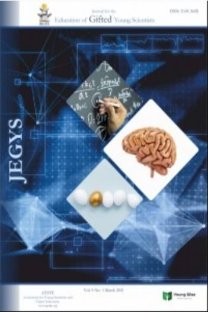Environment-Friendly Education as A Solution to Against Global Warming: A Case Study at Sekolah Alam Lampung, Indonesia
The negative nature of human damages the earth by destroying nature and the environment, which ultimately causes global warming. One solution to the environmental problem of global warming is to educate students from an early age to have ecological awareness and not to destroy the earth. The purpose of this study is to find things that need to be developed in environmentally-friendly education as a solution to global warming. This type of research is descriptive qualitative. The research was conducted at Sekolah Alam Lampung, Indonesia. Sekolah Alam Lampung applies an environmentally-friendly perspective and loves to nature through activities namely do not burn trash, do not smoke, recycle the trash, compost and provide trash cans and green laboratories. Learning activities are carried out not only in the classroom but also outside the classroom by bringing students back to nature. The activity of the Sekolah Alam Lampung is an alternative solution to the environmental crisis regarding global warming which is now increasingly severe and contributes conceptually to overcome the global warming which has been a global issue
___
- Budiman, I., & Susilo, A. (2018). Aplikasi E-DAP pada Sekolah Alam Bekasi. Ikraith -Informatika, 2(1), 57–62.Cahyono, W. E. (2015). Pengaruh Pemanasan Global terhadap Lingkungan Bumi, Peneliti Bidang Pengkajian Ozon dan Polusi Udara. Lapan, 28–31.Dal, B. B., Ozturk, N., Alper, U., Sonmez, D., & Cokele, A. (2010). An Analysis of the Teachers’ ClimateChange Awareness. Athens Journal of Education, X(Y), 1–13.Fauzi. (2018). Pembentukan dan Transformasi Core Values di Sekolah Alam. Jurnal Ilmiah VISI PGTK PAUD dan DIKMAS, 13(1), 17–27.Hidayati, I. F., & Prihatin, T. (2016). Pengelolaan Kurikulum Sekolah Alam di TK Alam Al Biruni Cirebon. Indonesian Journal of Curriculum and Educational Technology Studies. 4(1), 32–39http://sekolahalamlampung.weebly.com/peta-lokasi.htmlEl Islami, RAZ, Nuangchalerm, P, and Sjaifuddin, S. (2018). Science Process of Environmental Conservation: A Cross National Study of Thai and Indonesian Pre-service Science Teachers. Journal for the Education of Gifted Young Scientists. 6(4), 72–80. Journalist Team Sekolah Alam Lampung. (2013). Sekolah Asyik: Sekolahku yang Terindah di Sai Bumi Ruwa Jurai. Bandar Lampung: Yayasan Sekolah Alam Lampung.Kılınç, A., Boyes, E., & Stanisstreet, M. (2011). Turkish School Students and Global Warming: Beliefs and Willingness to Act, Eurasia Journal of Mathematics. Science & Technology Education. 7(2), 121–134.Lasat, M. M., Chung, K. F., Lead, J., McGrath, S., Owen, R. J., Rocks, S., Zhang, J. (2018). Advancing the Understanding of Environmental Transformations, Bioavailability and Effects of Nanomaterials, an International US Environmental Protection Agency—UK Environmental Nanoscience Initiative Joint Program. Journal of Environmental Protection. 9(4), 385–404. Martusa, R. (2009). Peranan Environmental Accounting terhadap Global Warming. Jurnal Akuntasi. 1(2), 164–179.Maulana, H. (2016). Pelaksanaan Pendidikan Karakter Di Sekolah Alam. Jurnal Khasanah Ilmu. 7(1), 21–31.Murdiani, S., & Suhendi. (2012). Belajar Bersama Alam: Sebuah Buku Putih Konsep Sekolah Alam melalui Kurikulum Pendidikan Total. Jakarta: SoU Publisher.Nova, L. (2009). Wawancara Lendo Novo, Pendiri Sekolah Alam, dengan Wimar Witoelar di Perspekti Baru edisi 695.Nuangchalerm, P., & El Islami, R. A. Z. (2018). Context of Science on Environmental Conservation: Comparative Study between Thai and Indonesian Novice Science Teacher Students. Jurnal Penelitian dan Pembelajaran IPA. 4(1), 60.Nuangchalerm, P., & El Islami, RAZ. (2018). Comparative study between Indonesian and Thai Novice Science Teacher Students in Content of Science. Journal for the Education of Gifted Young Scientists. 6(2), 23–29. Nugraha, A., Sutjahjo, S. H., & Amin, A. A. (2018). Persepsi dan Partisipasi Masyarakat Terhadap Pengelolaan Sampah Rumah Tangga melalui Bank Sampah di Jakarta Selatan. Jurnal Pengelolaan Sumberdaya Alam Dan Lingkungan. 8(1), 7–14O’Brien, C. (2010). Sustainability, Happiness and Education. Journal of Sustainability Education, 1, 1–18.Rahmi, R., Mini, R., & Salim, A. (2017). Peran Pelibatan Diri Siswa sebagai Mediator dalam Hubungan antara Iklim Kelas dengan Sikap Kreatif Siswa SD Sekolah Alam. Jurnal Psikologi Undip. 16(1), 77–87.Ramian, M. (2002). Pemanasan Global (Global Warming). Jurnal Teknologi Lingkungan. 3(1), 30–32.Rini, A. S., Sukaatmadja, P. G., Kt, I. G. A., & Giantari. (2017). Pengaruh Pengetahuan Lingkungan Dan Kepedulian Lingkungan Terhadap Sikap Dan Niat Beli Produk Hijau “The Body Shop” Di Kota Denpasar. E-Jurnal Ekonomi Dan Bisnis Universitas Udayana. 6(1), 137–166.Riyanto. (2007). Strategi Mengatasi Pemanasan Global (Global Warming). Value Added. 3(2), 67–79.Saregar, A., Irwandani, I., Abdurrahman, A., Parmin, P., Septiana, S., Diani, R., & Sagala, R. (2018). Temperature and Heat Learning Through SSCS Model with Scaffolding: Impact on Students’ Critical Thinking Ability. Journal for the Education of Gifted Young Scientists, 6(3), 39–54.Schools, C. F. (2012). Climate Change and Environmental Education. Unicef, 1–37.Sulistyono. (2016). Pemanasan Global (Global Warming) dan Hubungannya dengan Penggunaan Bahan Bakar Fosil. Forum Teknologi. 2(2), 47–56.Tompodung, T. C. G., Rushayati, S. B., & Aidi, M. N. (2018). Efektivitas Program Adiwiyata Terhadap Perilaku Ramah Lingkungan Warga Sekolah Di Kota Depok. Jurnal Pengelolaan Sumberdaya Alam Dan Lingkungan. 8(2), 170–177. Warjiyono. (2016). Penerapan Green Computing Dalam Upaya Efesiensi Sumber Daya Di Amik BSI Tegal. IJSE – Indonesian Journal on Software Engineering, 2(1).Yafie, A. (1994). Menggagas Fiqh Sosial: Dari Soal Lingkungan Hidup, Asuransi Hingga Ukhuwah. Bandung: Mizan.Yulianti, & Prihatin, S. (2014). Kajian Kurikulum Sekolah Alam dalam Rangka Mewujudkan Pendidikan Karakter Siswa Tingkat Sekolah Dasar. Jurnal Pemikiran Dan Pengembangan SD. 1(4), 288–291.
- Başlangıç: 2013
- Yayıncı: Genç Bilge Yayıncılık
Sayıdaki Diğer Makaleler
Anisa Fatkhul JANNAH, Rully Charitas İndra PRAHMANA
Ahmad WALİD, Sajidan SAJİDAN, Murni RAMLİ, Raden Gamal Tamrin KUSUMAH
Lyudmila MOSİENKO, Larisa ILYİNA, Yulia KHARLAMOVA
Rizhal RİSTANTO, Puji LESTARİ, Mieke MİARSYAH
Himawan PUTRANTA, Jumadi JUMADİ
Muhammad Syawal AMRAN, Saemah RAHMAN, Shahlan SURAT, Abu Yazid ABU BAKAR
Yusmansyah YUSMANSYAH, Diah UTAMİNİNGSİH, Muswardi ROSRA, Redi EKA ARDİYANTO, Citra ABRİANİ MAHARANİ, Novinta NURULSARİ
